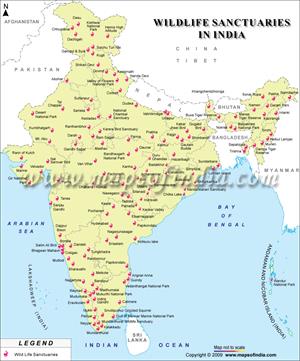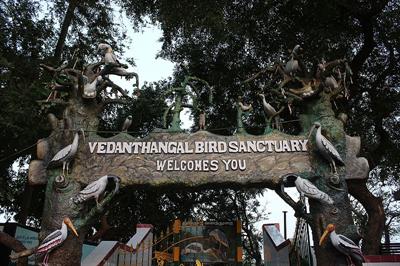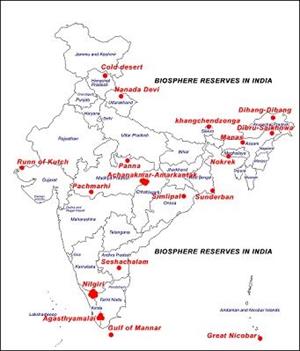PDF chapter test TRY NOW
Wildlife Sanctuaries
A sanctuary is a protected reserved area for conservation of wild animals. It is the place where the wild animals remain safe. Human activities like harvesting timber, collection of forest products, grazing, collection of medicinal plants, and private ownership rights are allowed here. Controlled interference like tourist activity is also allowed.
Wildlife sanctuary is a protected area created for the protection of wild animals in its natural environment.
Threatened wild animals like blackbuck, white-eyed buck, golden cat, pink-headed duck, marsh crocodile, python, elephants, gharialetc. are protected and preserved in its natural environment. Indian wildlife sanctuaries have different flora and fauna with unique landscapes - broad level forests, mountain forests and bushlands in deltas of big rivers.
Differences between national parks and wildlife sanctuaries are summarised below:
Wildlife Sanctuary | National Parks |
| Human activities like grazing, cultivation, tourist activity are allowed | No human activities or interference is allowed. |
| The main aim is to protect a particular flora or fauna. | National parks can include flora, fauna or any other objects that are of historical or cultural significance. |
| There are no boundaries fixed. | The boundaries are fixed and defined. |
| Open to general public. | Not usually opened to the public. |
| Wildlife sanctuaries are formed by order of Central or the State Government. | National Parks are formed by the State or Central Legislature. |
| It can be upgraded to a national park. | It cannot bedowngraded to a sanctuary. |
Wildlife Sanctuaries in Tamil Nadu:
Name | Established year | District |
| Meghmalai Wildlife Sanctuary | 2016 | Theni |
| Vandaloor Wildlife Sanctuary | 1991 | Chennai |
| Kalakad Wildlife Sanctuary | 1976 | Thirunelveli |
| Grizzled squirrel Wildlife Sanctuary | 1988 | Virudhunagar |
| Vedanthangal Wildlife Sanctuary | 1936 | Kanchipuram |

Wildlife Sanctuaries in India

Vedanthangal Bird Sanctuary
Biosphere Reserve:
Biosphere reserve is a protected area where the human population also forms part of the system.
It is an area for the conservation of wildlife, biodiversity, and the tribes inhabiting the area. The local tribal people also are part of the biosphere reserves. The area of these places will be around 5000 square \ kilometers. Biosphere reserves conserve the ecosystem, species and genetic resources.
These areas are set up mainly for economic development. Exploitation of the natural resources for commercial purposes is not allowed. Biosphere reserves provides opportunity for scientific research, tourism, and environmental education.
In India, there are 18 biosphere reserves. Some of the biosphere reserves present in India includes :
Name of Biosphere Reserve | State |
| Nanda Devi Biosphere Reserve | Uttar Pradesh |
| Nokrek Biosphere Reserve | Meghalaya |
| Manas Biosphere Reserve | Assam |
| Sunderbans Biosphere Reserve | West Bengal |
| Gulf of Mannar Biosphere Reserve | Tamil Nadu |
| Nilgiri Biosphere Reserve | Tamil Nadu |
| Great Nicobar and Similipal Biosphere Reserve | Orissa |

Biosphere Reserves in India
Advantages of In-situ conservation:
1. Species can be adapted to their habitat.
2. The species can interact with each other.
3. The natural habitat is maintained.
4. Less expensive and easy to maintain and manage.
5. Indigenous people interests are protected.
